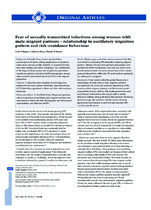Fear of sexually transmitted infections among women with male migrant partners – relationship to oscillatory migration pattern and risk-avoidance behaviour

View/
Date
2006Author
Hughes, Gail
Hoyo, Catherine
Puoane, Thandi
Metadata
Show full item recordAbstract
BACKGROUND: In South Africa, former apartheid laws
encouraged rural males seeking employment to migrate to
urban areas, moving weekly, monthly or annually between
their rural families and urban workplaces. The combination
of the migrant labour system and long family separations
caused an explosion of serious health consequences, among
others sexually transmitted infections (STIs) in the migrant
population.
OBJECTIVE: To describe some correlates of male migration
patterns for the rural women left behind, especially the fear
of STIs that this engendered in them and their risk-avoidance
behaviour.
Setting and subjects. In KwaZulu-Natal, 208 prenatal patients
who were partners of oscillating male migrant workers were
interviewed to determine their demographic and behavioural
characteristics, and their fear of STIs.
RESULTS: Thirty-six per cent of the rural women said that they
were afraid of contracting STIs from their returning migrant
partners. Women who saw their partners infrequently were
more fearful of STI transmission, and were less able to have
sexual communication. However, almost none of the women
protected themselves, while only 8% used condoms, primarily
for contraceptive purposes.
CONCLUSIONS: These results reflect the gender-based power
relationships of South African male migrants and their
rural partners, the social and economic dependency of the
women on their migrant partners, and the women’s social
responsibility to bear children. The results point to the need
to go beyond interventions that simply seek to modify
behaviour without altering the forces that promote risk taking
and discourage risk reduction, and the need to develop
appropriate interventions to curb STIs and decrease HIV.
